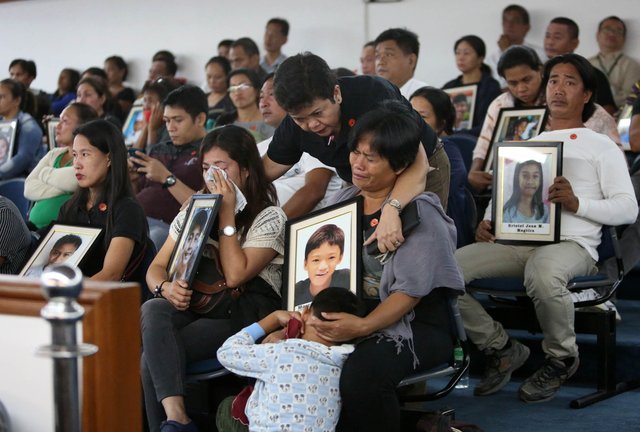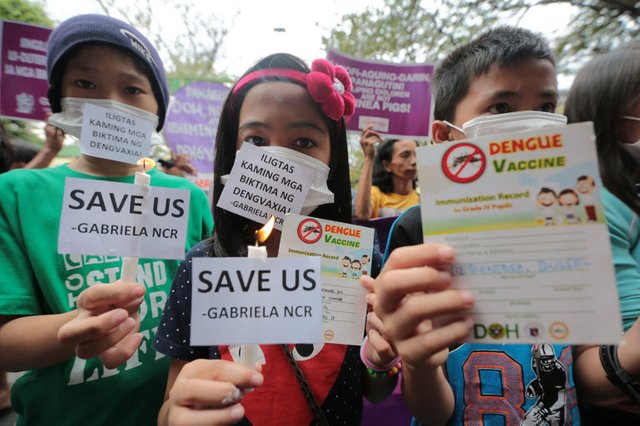 Parents of children vaccinated with Dengvaxia cry during a Senate hearing in the Philippines. Image source.
Parents of children vaccinated with Dengvaxia cry during a Senate hearing in the Philippines. Image source.
by Brian Shilhavy
Editor, Health Impact News
Health Impact News reported late last year (December 2017) that vaccine manufacturer Sanofi Pasteur admitted that their vaccine for dengue (a deadly tropical disease spread mostly by mosquitoes) was defective.
In a press release from France, the pharmaceutical company admitted that the vaccine is harmful to those not previously infected with dengue, and could cause children not previously infected with dengue to contract a severe case of the disease.
Their press release stated:
Based on up to six years of clinical data, the new analysis evaluated long-term safety and efficacy of Dengvaxia in people who had been infected with dengue prior to vaccination and those who had not.The Philippines was the first country in Asia to approve the vaccine for individuals aged 9 and 45 years old in December 2015.The analysis confirmed that Dengvaxia provides persistent protective benefit against dengue fever in those who had prior infection.
For those not previously infected by dengue virus, however, the analysis found that in the longer term, more cases of severe disease could occur following vaccination upon a subsequent dengue infection.
More than 800,000 Filipino children have received at least one dose of Dengvaxia, the first licensed vaccine for the virus, since the Philippine Department of Health launched the vaccination drive in schools in 2016.
Former Philippine President Benigno Aquino III stated recently that he would not have approved a mass immunization program in 2015 using Dengvaxia had Sanofi Pasteur, the French pharmaceutical company that developed the dengue vaccine, made known then that the drug posed risks to the health of some people.
Reports of severe cases of Dengue and even some deaths have been related to the Dengvaxia vaccine, and the Philippine Department of Health (DOH) has set up "express lanes" at local hospitals to deal with illnesses and injuries due to the vaccine.
 Protesting children and parents wear facemasks and light candles at the gate of Department of Health (DOH) headquarters in Sta. Cruz., Manila on Wednesday, February 7, 2018 to call on the government for support to all recipients of the controversial Dengvaxia vaccine.
Protesting children and parents wear facemasks and light candles at the gate of Department of Health (DOH) headquarters in Sta. Cruz., Manila on Wednesday, February 7, 2018 to call on the government for support to all recipients of the controversial Dengvaxia vaccine.
INQUIRER PHOTO / GRIG C. MONTEGRANDE
French pharmaceutical giant Sanofi Pasteur has denied any wrongdoing in their marketing of the Dengvaxia vaccine in the Philippines.
The Philippine DOH has filed a lawsuit against Sanofi for failing to refund them the cost of the vaccines, and for refusing to set up a compensation fund for vaccinated children who became ill due to the vaccine.
“The Office of the Secretary received the letter from Sanofi this morning saying that they are declining our request for a refund of the used vaccines and the setting up of indemnification fund,” Health Undersecretary Eric Domingo said in an interview with reporters.“The Secretary (Francisco Duque III) was very unhappy … [We had wanted to settle this through negotiation] but this will leave us with no recourse but to file a case,” he said. (Source.)
Sanofi Seeks FDA Approval in the U.S. for Dengvaxia Vaccine
In the vaccine marketing trade publication FiercePharma, it is being reported that Sanofi is not going to let the "Dengvaxia mess" in the Philippines stop them from seeking FDA approval for the vaccine to be sold in the U.S.Sanofi won't let Philippines Dengvaxia mess deter it from seeking U.S. approval: report
Dengue is a tropical disease spread mainly by mosquitoes and very uncommon in the U.S., so why is Sanofi seeking to get the vaccine into the U.S. market?According to FiercePharma:
While dengue rarely occurs in the continental U.S., it is endemic in Puerto Rico, as well as in Latin America and Southeast Asia, and could pose a threat to people traveling to those regions, according to the CDC.An FDA approval also would go a long way to easing concerns elsewhere about the safety of the vaccine.
The other huge reason not reported in the FiercePharma article is that Sanofi would not face legal prosecution for a faulty vaccine product in the U.S., since the National Childhood Vaccine Injury Act of 1986 protects all vaccine manufacturers from being sued in court due to injuries and deaths resulting from vaccines.
With little to no apparent benefit for a Dengue vaccine to U.S. children, but great risk to children world-wide as we have seen in the Philippines, one must wonder what the financial connections might be for the Dengvaxia vaccine between U.S. government agencies like the FDA and CDC and French drug maker Sanofi.
Comment on this article at VaccineImpact.com.
See also:
730,000 Filipino Children Receive Faulty Dengue Vaccine Which Causes Dengue Rather Than Preventing it
Sanofi Dengue Vaccine Scandal an Example of Government and Big Pharma Corruption
Originally published at VaccineImpact.com and Health Impact News